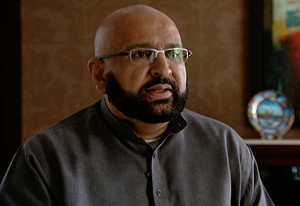By Ben Farmer, Kabul & Dean Nelson in New Delhi

Watan Group's owner Ahmad Rateb Popal was accused of paying off Taliban in the past. (Photo: CBC)
Watan Oil and Gas, controlled by President Karzai's notorious cousins Rashid and Rateb Popal, won the oil extraction contract in a joint venture with a Chinese state-owned firm despite accusations another of their companies used US funds to pay protection money to Taliban commanders.
The 25-year deal gives Watan and the China National Petroleum Company access to an estimated 160 million barrels of oil from three fields in northern Afghanistan.
Up to £2 trillion of minerals, oil and gas are estimated to be beneath Afghanistan and its mineral riches are key to Western hopes the country can one day wean itself from foreign aid and pay its own way.
The oil deal in the Amu Darya Basin had been seen as a model for further fossil fuel contracts, but diplomats and activists are now concerned it heralds the carving up of Afghanistan's resources.
The selection of a group controlled by President Karzai's cousins Rashid and Rateb Popal, who served nearly nine years in jail in New York in the 1990s on drugs charges, has caused particular alarm.
"I think we all desperately hoped that British soldiers were dying for something more noble than helping Karzai's drug dealing cousin to sell gas from northern Afghanistan to the Chinese," one former senior diplomat to Kabul told The Daily Telegraph.
Another of their companies, Watan Risk Management, provides security to supply convoys and was at the heart of a US Congressional investigation into protection companies paying the Taliban millions of dollars for safe passage.
The investigation found the brothers used a warlord to provide security and he allegedly paid millions to the Taliban in what became one of the insurgent's biggest income streams.
The brothers denied paying off the Taliban, but officials attempted to block them from further US contracts.
"The fact that Watan continues to receive contracts despite the allegations against it is a concern," said Juman Jubba, Afghanistan researcher for Global Witness, which campaigns against corruption in mining deals.
"It is crucial that company histories are considered during the bidding process and that reasoning and justifications for awarding each contract are made public."
The contract was awarded in December, but has seen renewed scrutiny in recent weeks as a potential source of violence in northern Afghanistan.
Competition over the benefits from the oil deal is thought to have triggered a confrontation between Mr Karzai's government and General Abdul Rashid Dostum, the Uzbek strongman who controls the area.
The Afghan National Security Council accused Gen Dostum earlier this month of treason for holding up the work and said he was trying to extort money from the Chinese.
His spokesman said he had just complained that security guards and workers should be from the local area, rather than being brought in by Watan.
Watan and the Chinese have pledged to produce 150,000 barrels by the end of this year.
They won the contract against three other firms and offered far better terms than their competitors, observers said.
Javed Noorani, a researcher for Integrity Watch Afghanistan, said the bidding had been tightly overseen by US advisers and the Chinese had offered an "excellent deal", by paying 15 per cent royalties and promising Kabul 50 to 70 per cent of the profits.
By securing the deal with such favourable terms to the government, the Chinese are now well placed to win the far larger Afghan Tajik fields, which hold up to 1.6 billion barrels of oil and gas, he said.




